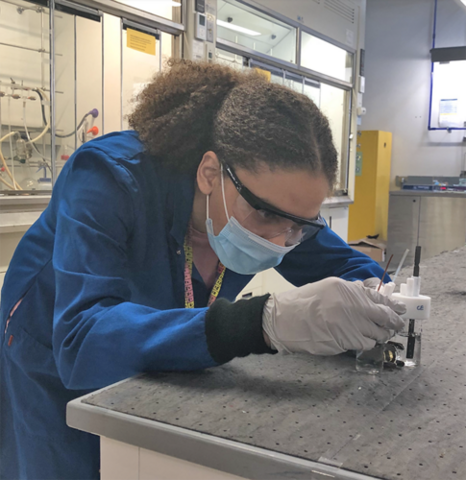
Yale Chemistry Ph.D. candidate Nia Harmon was recently awarded a 2021 Rising Solar Fellowship by the Women of Renewable Industries and Sustainable Energy (WRISE) and GRID Alternatives.
These awards are given to individuals from diverse backgrounds interested in solar careers to network and receive mentorship and professional development. The fellowship also covers expenses to attend the annual North American Smart Energy Week, held virtually this year.
Harmon is a graduate student specializing in materials chemistry in the research lab of Hailiang Wang, associate professor of chemistry, at the Yale Energy Sciences Institute. She studies the electrochemical conversion of nitrate to ammonia. Nitrate is a pollutant commonly found in groundwater and other bodies of water, and ammonia is a chemical compound that can serve as a fertilizer, chemical feedstock, and fuel. Her research aims to develop selective and energy-efficient heterogeneous catalysts for electrochemical nitrate reduction, which has larger implications on sustainable ammonia production from nitrate.
“The 2021 WRISE Solar Power Fellowship allowed me to connect with women leaders in the field of solar energy and network with representatives from solar technology companies to better understand the challenges ahead for more widespread use of solar power,” said Harmon. “This experience has led to mentorship relationships and a better understanding of the practical application of solar technology, two components that will enhance my development as a graduate student as I work towards a career as a professor.”
“Nia is highly motivated to solve big energy and environmental problems,” Wang said. “In preparation for that, she is working very hard every day in the lab. This fellowship is recognition of her achievement and a good opportunity for her to be more engaged in the renewable energy community.”
Materials chemists work to solve the most significant challenges of our time, from sustainable energy storage and environmental challenges to the development of quantum devices and quantum communication technology. Learn more about materials chemistry at Yale and the Wang Research Lab.